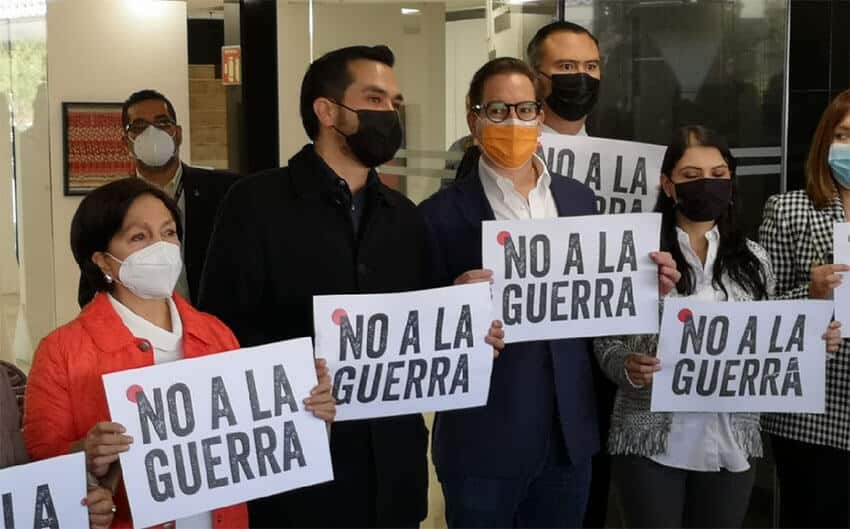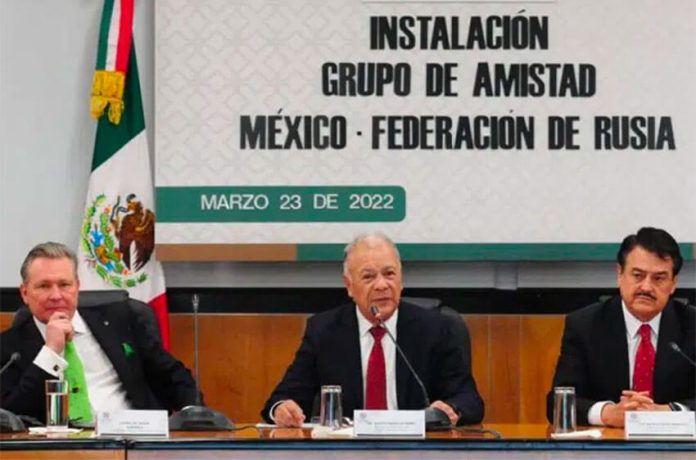Mexico has condemned Russia’s invasion of Ukraine, but that didn’t stop a group of lawmakers from creating a Mexico-Russia friendship group.
Made up of deputies from the ruling Morena party, the Labor Party (PT) and the Institutional Revolutionary Party (PRI), the group was formally established Wednesday in the lower house of Congress while Citizens Movement (MC) party lawmakers protested against the move.
Russian Ambassador Viktor Koronelli acknowledged the committee’s creation as an indication of Mexico’s solidarity with Russia.
“This mechanism is a sign of support, solidarity and friendship for us,” Koronelli said, observing that the group was formed during “complicated times.”
He asserted that Russia didn’t start the war, but “is finishing it,” condemned fake news about the conflict in the west, charged that Russia is a victim of discrimination and racial hate and offered dubious justifications for the “special military operation” in Ukraine.
Koronelli also acknowledged that Mexico has not imposed any sanctions on Russia.
“We very much respect the position shown on several occasions by the president of Mexico, Andrés Manuel López Obrador ,[and] Foreign Affairs Minister Marcelo Ebrard,” Koronelli said.
“[They have indicated] that Mexico will never join in with the anti-Russian sanctions and that it will not supply arms to Ukraine, despite the requests of the Ukraine government,” the ambassador said.
“In the world today there are countries like China, India and Mexico that will never reply ‘Yes, sir’ to the orders of Uncle Sam,” he said. “… Our relationship with Mexico has a strategic character and is based on mutual respect of national interests.”
Members of the friendship group – whose creation had been postponed due to the situation in Ukraine – said they were concerned about the lack of peace, but didn’t condemn Russia’s invasion, the newspaper Reforma reported.
PT president and lawmaker Alberto Anaya thanked Koronelli for the “pertinent” information he offered about the conflict in Ukraine, while 92-year-old PRI Deputy Augusto Gómez praised the ambassador for representing the “heroic people” of Russia and “illuminating the thinking” of his fellow lawmakers.

Morena Deputy Armando Contreras claimed that Mexican lawmakers are “always ready to do everything we can to increase the friendship, relations and cooperation between Mexico and Russia in every aspect of the world and life.”
In a Twitter post, the deputy said he had emphasized that “we’ll strive for a peaceful solution to the Russia-Ukraine conflict as well as a prompt meeting of lawmakers from … [Mexico and Russia] to create an agenda that unites our nations.”
Three National Action Party (PAN) lawmakers were slated to join the friendship group, but pulled out at the last minute. Deputies with the conservative party said they didn’t want to be part of the “imprudence and lack of sensitivity” the formation of the group represented.
MC deputies protested its establishment and demonstrated their support for Ukraine, holding up signs that read “No to the war.”
“The best way of showing our friendship with the Russian people is … to isolate its tyrannical government that is massacring … [the Ukrainian] people,” said Salomón Chertorivski, an MC deputy and former federal health minister.
“There are already more than 3 million displaced Ukrainians. With complete force but in a peaceful way we express our rejection of the installation of the Mexico-Russia friendship group,” he said, referring to the number of people who have left Ukraine since the invasion began.
MC Deputy Jorge Álvarez Máynez said the group’s creation was incongruent with Mexico’s condemnation of Russia at the United Nations.
“We don’t have a conflict between two guilty parties; we have a clear invader and … people who are being massacred,” he added.
While Mexico condemned Russia’s invasion in a message delivered by the foreign minister in late February and at a March 2 session of the United Nations General Assembly, López Obrador on Wednesday used different language to describe the country’s position.
“In the case of the war we’re not going to participate in favor or against. Our position is one of neutrality, which has to do with the [non-interventionist] foreign policy of Mexico. Of course we’re in favor of peace and peaceful solution of disputes. Hopefully [there will be] dialogue and an agreement is reached, but we don’t want to be protagonists, to offer our mediation – no. That’s what the United Nations is for,” he said.
The cozying up of some lawmakers to Russia comes at a time when Mexico’s relations with Europe are strained due to López Obrador’s pointed criticism of the European Parliament after it condemned the harassment and killing of journalists and human rights defenders in Mexico in a resolution approved on March 10.
